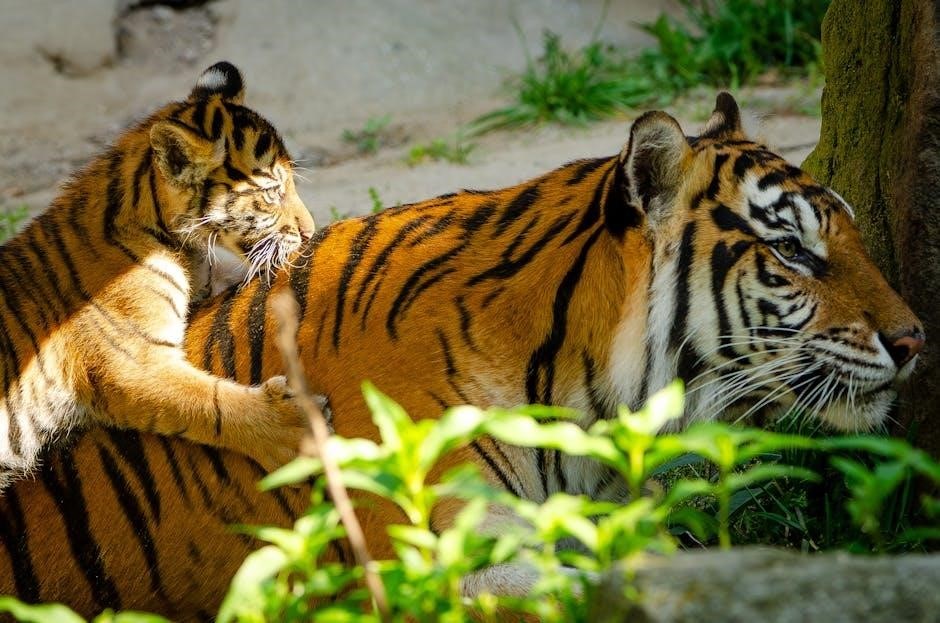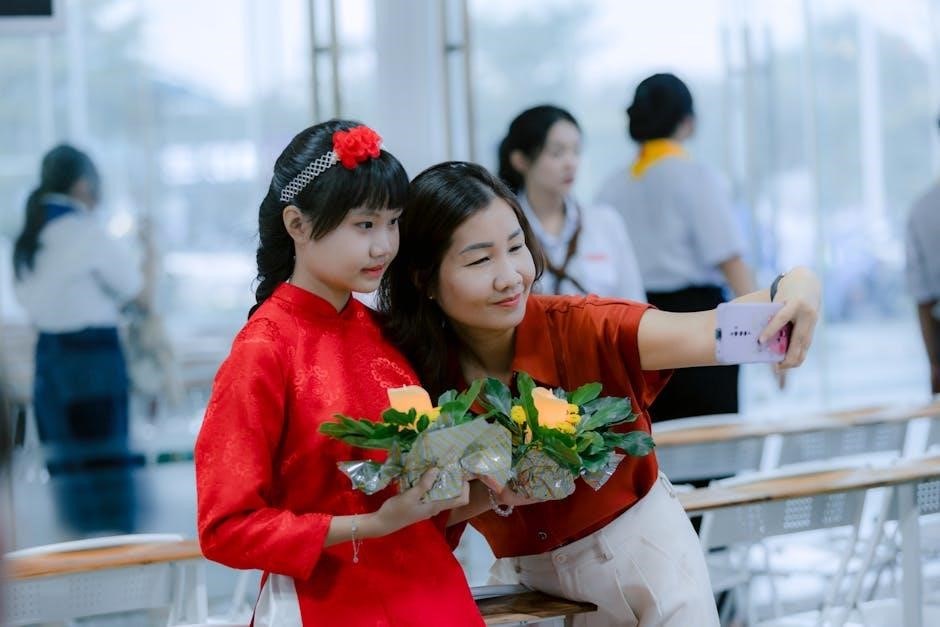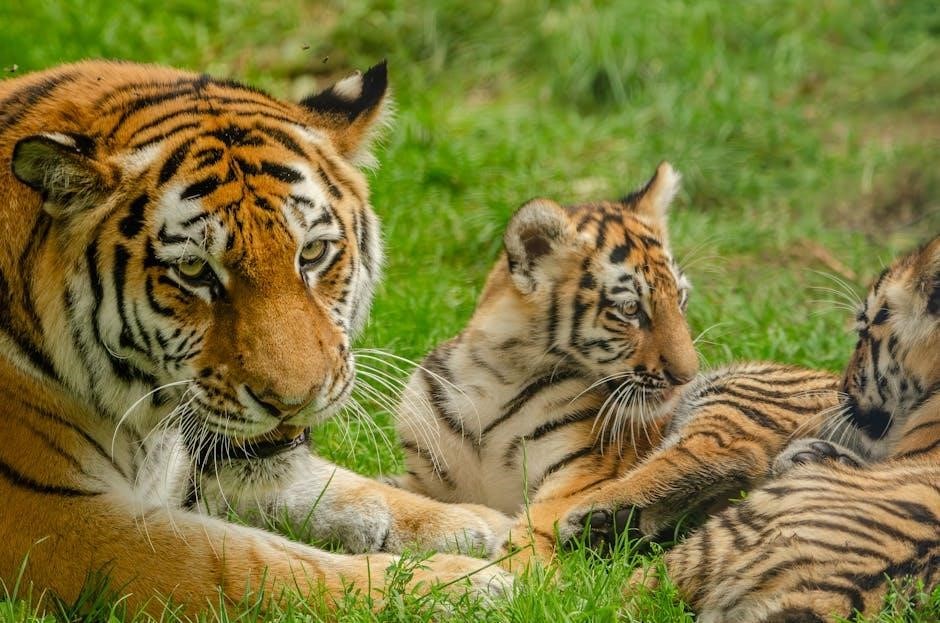battle hymn of the tiger mom pdf

Battle Hymn of the Tiger Mother, a memoir by Amy Chua, explores the intense parenting methods of Chinese mothers, sparking debates on cultural parenting styles and their impact.
About the Author: Amy Chua
Amy Chua is a Yale Law professor and author, known for her provocative parenting memoir, Battle Hymn of the Tiger Mother. Born to Chinese immigrant parents, Chua combines her personal experiences with cultural insights, sparking global debates on parenting styles. Her writing often explores themes of cultural identity, family dynamics, and achievement. Chua’s work has been both praised and criticized, cementing her role as a prominent voice in discussions on education and parenting. Her unique perspective continues to influence conversations worldwide.
Publication Details and Initial Reception
Battle Hymn of the Tiger Mother was published in 2011 by The Penguin Press, sparking immediate controversy. The book, categorized under memoir and parenting, became a global sensation, with its excerpt in the Wall Street Journal igniting debates. Critics and readers polarized over Chua’s strict parenting methods, leading to extensive media coverage. The book’s popularity also led to a widely available PDF version, making it accessible worldwide. Its release marked a turning point in discussions about cultural parenting styles, solidifying its place in modern literary discourse.
Key Themes and Controversies
Central to Battle Hymn of the Tiger Mother is the clash between Eastern and Western parenting philosophies. Amy Chua’s strict, demanding approach, emphasizing achievement and discipline, contrasts sharply with Western ideals of self-expression and individuality. The book sparked intense debate, with critics accusing Chua of emotional abuse, while supporters defended her methods as culturally rooted. Themes of generational decline, cultural identity, and the cost of high expectations fueled the controversy, making it a polarizing yet thought-provoking read.
Core Concepts of the Tiger Mother Philosophy
The Tiger Mother Philosophy emphasizes high expectations, strict discipline, and the pursuit of excellence, often contrasting with Western parenting’s focus on individuality and self-expression.
Definition of a Tiger Mother
A Tiger Mother is a term popularized by Amy Chua, describing a parenting style characterized by strict, demanding, and sometimes harsh methods to ensure children achieve success. These mothers prioritize academic excellence, musical mastery, and adherence to family values over personal desires or peer acceptance. The approach often involves intense pressure, criticism, and high expectations, reflecting a belief in hard work and sacrifice to secure a child’s future. This style contrasts sharply with Western parenting, which tends to emphasize individuality and self-expression, often leading to cultural and generational conflicts, as seen in Chua’s memoir, which sparked debates worldwide about the effectiveness and ethics of such methods. The Tiger Mother’s philosophy is deeply rooted in Chinese cultural values, emphasizing respect for elders, discipline, and the avoidance of failure, which are seen as essential for a child’s long-term success and happiness. However, critics argue that this approach can lead to emotional strain and a lack of creativity, highlighting the challenges of balancing cultural traditions with modern parenting ideals. The book has become a symbol of the broader discussion on parenting styles and their impact on child development, with many parents and experts weighing in on the pros and cons of the Tiger Mother approach. Overall, the definition of a Tiger Mother is one of unwavering dedication to a child’s success, often at the cost of their immediate happiness, reflecting a complex interplay of cultural expectations and parental love.
Chinese vs. Western Parenting Styles
Chinese mothers, as depicted in Battle Hymn of the Tiger Mother, prioritize achievement, discipline, and family honor, often pushing children to excel academically and musically. They emphasize hard work, sacrifice, and avoiding failure, reflecting cultural values of respect and obligation. In contrast, Western parents focus on fostering creativity, individuality, and emotional well-being, encouraging children to explore their interests freely. This clash of approaches highlights differing beliefs about what constitutes successful parenting, sparking debates on cultural priorities and child development. The Tiger Mother philosophy challenges Western norms, raising questions about the balance between achievement and happiness.
The Role of Discipline and Achievement
Battle Hymn of the Tiger Mother underscores the importance of strict discipline and high achievement in Chinese parenting. Amy Chua recounts how she demanded excellence from her daughters, pushing them to master musical instruments and academic subjects. She believes that relentless effort and sacrifice lead to success, often at the cost of childhood freedoms. This approach contrasts sharply with Western emphasis on self-expression, revealing a cultural divide in views on child-rearing. Chua’s methods, though controversial, reflect a deep belief in the power of discipline to shape achievement and character, sparking debates on parenting extremes.

The Memoir: Structure and Content
Battle Hymn of the Tiger Mother is structured into chapters detailing Amy Chua’s parenting journey, focusing on her daughters’ struggles and triumphs, blending personal anecdotes with cultural insights.
Chapters Overview
Battle Hymn of the Tiger Mother is divided into 18 chapters, organized into three parts. Part One introduces the Chinese mothering philosophy, detailing Chua’s strict approach. Chapters like “The Chinese Mother” and “Sophia” highlight early successes. Part Two explores challenges, with chapters like “Lulu’s Instrument” and “The Violin,” showing conflicts over music and cultural expectations. Part Three reflects on outcomes, with chapters like “Rebellion” and “Despair,” revealing the emotional toll and ultimate lessons learned. The book blends personal anecdotes with cultural analysis.
Personal Stories: Sophia and Lulu
Sophia and Lulu, Chua’s daughters, are central to the memoir. Sophia, the elder, thrived under Chua’s strict methods, excelling in piano and academics. Lulu, however, rebelled against the intense pressure, particularly with violin lessons, leading to emotional clashes. Their stories illustrate the highs and lows of Chua’s parenting approach, revealing both the achievements and the costs of her demanding style. Through their experiences, Chua reflects on cultural expectations, personal sacrifice, and the challenges of balancing tradition with modern parenting.
Cultural and Generational Conflicts
Cultural and generational conflicts are pivotal in Chua’s memoir. Her strict, traditional Chinese parenting style clashes with Western ideals of childhood freedom and individuality. Chua’s upbringing in a Chinese immigrant family contrasts sharply with her American-raised daughters’ expectations, leading to tensions. These conflicts highlight broader struggles between preserving cultural heritage and adapting to modern, Western values. The memoir serves as a lens to examine how differing cultural norms impact family dynamics and child-rearing practices across generations.

Reception and Backlash
Battle Hymn of the Tiger Mother sparked intense debate, with critics calling Chua’s methods harsh and supporters praising her dedication. The book received widespread media attention and backlash, including death threats, highlighting the polarizing nature of her parenting philosophy.
Public Reaction and Media Coverage
The release of Battle Hymn of the Tiger Mother ignited a firestorm of public debate. Media outlets worldwide scrutinized Amy Chua’s parenting methods, with many labeling her approach as extreme. The book became a polarizing topic, with some praising Chua’s dedication to her daughters’ success, while others criticized her for being overly harsh. The Wall Street Journal excerpt, titled “Why Chinese Mothers Are Superior,” further fueled the controversy, leading to thousands of emails, including death threats, and widespread media coverage that cemented the book’s place in the national conversation on parenting.
Criticism and Support for Chua’s Methods
Amy Chua’s parenting methods in Battle Hymn of the Tiger Mother sparked intense debate. Critics accused her of emotional cruelty, arguing that her strict, demanding approach could harm children’s self-esteem and well-being. Others defended her, praising her emphasis on hard work, discipline, and achievement. Supporters saw her methods as a reflection of cultural values that prioritize family honor and success. The book divided opinions, with some hailing it as a bold critique of Western parenting and others condemning it as an endorsement of authoritarianism.
Impact on Parenting Discussions Worldwide
Battle Hymn of the Tiger Mother ignited global conversations about parenting styles, cultural differences, and child-rearing practices. Amy Chua’s provocative ideas challenged Western norms, prompting parents to reflect on their own approaches. The book’s controversial reception fueled debates in media, sparking discussions on topics like parental pressure, cultural expectations, and the balance between discipline and empathy. It became a catalyst for reevaluating parenting strategies, influencing how people worldwide view the role of culture in shaping family dynamics and educational goals.
Cultural and Social Implications
Battle Hymn of the Tiger Mother highlights cultural differences in parenting, sparking debates on education, identity, and generational values, reshaping global discussions on child-rearing and cultural expectations.
East vs. West: Parenting Styles Compared
Eastern and Western parenting styles differ significantly, as highlighted in Battle Hymn of the Tiger Mother. Eastern parents, like Chua, emphasize strict discipline, high expectations, and academic rigor, often prioritizing collective family honor over individual desires. In contrast, Western parents focus on fostering creativity, self-expression, and emotional well-being. These contrasting approaches reflect deeper cultural values, with Eastern methods often criticized for being overly demanding and Western styles seen as permissive. The book sparks debates about which approach yields better outcomes for children.
The Tiger Mother Debate in Modern Society
Battle Hymn of the Tiger Mother ignited a global debate about parenting styles, with critics accusing Chua of emotional harshness and supporters praising her results-driven approach. The book challenged Western norms, sparking discussions about cultural identity, parenting ethics, and child well-being. While some viewed her methods as extreme, others saw them as a reflection of high expectations rooted in Chinese culture. The controversy continues to influence modern parenting conversations, highlighting the tension between achievement and emotional nurture in raising children.
Influence on Asian-American Identity
Battle Hymn of the Tiger Mother profoundly impacted Asian-American identity by sparking conversations about cultural heritage and generational divides. Chua’s memoir resonated with many Asian-Americans who felt conflicted between their parents’ expectations and Western societal norms. Critics argued that the book reinforced stereotypes, while others saw it as a candid exploration of the challenges faced by Asian-American families. The memoir became a cultural touchstone, prompting discussions about belonging, identity, and the immigrant experience in modern America.

Availability and Downloads

Battle Hymn of the Tiger Mother is widely available in PDF format for download on platforms like Archive.org and other e-book repositories. Ensure legal access by using authorized sources.
Battle Hymn of the Tiger Mother PDF
The Battle Hymn of the Tiger Mother PDF is accessible for download on multiple platforms, including Archive.org, offering a digital version of Amy Chua’s memoir. Readers can find the PDF file, which includes all chapters and bibliographical references, making it convenient for those who prefer digital formats. The book is also available on e-book platforms, ensuring wide accessibility for global readers interested in Chua’s parenting philosophy and its cultural implications.
Platforms for Downloading the Book
Battle Hymn of the Tiger Mother is available for download on various platforms, including Archive.org, Google Books, and major e-book retailers like Amazon. Readers can also access the PDF through free eBook platforms or purchase it in formats like ePub and MOBI. The book’s digital versions ensure accessibility for readers worldwide, offering both free and paid options depending on the platform and region.
Free vs. Paid Versions: Legal Considerations
The Battle Hymn of the Tiger Mother is available in both free and paid versions online. Free PDF downloads can be found on platforms like Archive.org, but users must ensure compliance with copyright laws. Paid versions, offered through retailers like Amazon, support the author and publisher. Downloading copyrighted material without permission is illegal, emphasizing the importance of purchasing from authorized sources to respect intellectual property rights and sustain the publishing industry.
Battle Hymn of the Tiger Mother remains a provocative and influential work, sparking global debates on parenting styles and cultural values. Its legacy endures as a catalyst for discussions on family, achievement, and identity.
Long-Term Impact of the Book
Battle Hymn of the Tiger Mother has left a lasting impact, reshaping global conversations on parenting. Its exploration of cultural differences in child-rearing has influenced countless parents, educators, and policymakers. The book’s controversial methods sparked both praise and criticism, fueling ongoing debates about the balance between discipline and nurturing. Amy Chua’s work continues to be a reference point in discussions about education, identity, and family dynamics, ensuring its relevance in modern societal discourse.
Final Thoughts on Tiger Mothering
Battle Hymn of the Tiger Mother offers a provocative look at extreme parenting. While some praise its emphasis on achievement, others criticize its rigid methods. The book highlights the challenges of blending cultural traditions with modern expectations, prompting readers to reflect on their own parenting styles. Ultimately, Amy Chua’s memoir serves as a catalyst for broader discussions about family, culture, and the pursuit of excellence, leaving a lasting imprint on the parenting landscape.
Leave a Reply
You must be logged in to post a comment.